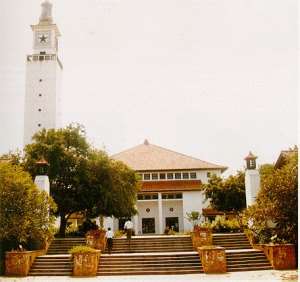
…128 on study or sabbatical leave Gone are the days when the exodus of professionals was the preserve of nurses and doctors. These days, university lecturers have been abandoning the classrooms, as well. The reason: for greener pastures.
The spotlight is on the University of Ghana, where reports of senior lecturers abandoning the classrooms paint a worrying picture of the university becoming a pale shadow of its glorious past.
'Leave of Absence,' 'Study Leave' and 'Sabbatical Leave' have become the exit routes for many of the lecturers. The school's records show that there are currently, 59 senior lecturers either on leave of absence or sabbatical, while 69 are on study leave ranging from two to five years. This brings the total to 128 lecturers absent from the classrooms.
University sources told Public Agenda that, 'study leave or sabbatical leave has become the best excuse for lecturers quitting the classrooms for good. The sources say evidence of lecturers returning from leave of absence is nothing to write home about.
Faced with ageing lecturers and the refusal of young graduates to join the academic profession, the university currently has 734 lecturers supervising over 27,000 students. The university's minimum standards require a teaching staff of 1,800 to adequately meet the needs of its ever growing student population. This leaves the university with a staff deficit of 1066. The teaching staff shortage is so frightening that currently, one lecturer supervises 37 students, instead of 15. What it means is that out of the 734 lecturers, 238 (comprising those on leave of absence, sabbatical and those recalled) are not effectively teaching. Realistically, there are only 606 lecturers in the classrooms.
Due to the unwillingness of young graduates to take up teaching posts at the university, a total of 110 retired lecturers have been recalled to the classrooms.
As to how many of these would return to classrooms, it can only remain a guess. “We might have to close down some faculties if we cannot replace the lecturers who are leaving,” was what the Acting Director of Human Resource, Mr. E. F. Akpedonu told this reporter when he was asked what the University would in the face of the exodus.
According to Mr. Akpedonu, while no one can stop the senior lecturers from leaving because of low wages, the biggest problem confronting the university is how to convince young graduates to take up to lecturing as a profession. Professor P. W. K Yankson, Head of the Department of Geography and Resource Development told Public Agenda that though his department has not had staff exodus, “it is difficult recruiting fresh ones”, due to poor conditions of service. Dr. Thomas Akabzaa, a senior lecturer at the Department of Geology agrees with Professor Yankson. “Compared with our colleagues in other public institutions in the country, what lecturers receive as salaries are peanuts,” Dr. Akabzaa stressed.
Information gathered at the Department of Economics show that with a total teaching staff of about 20, about seven are already on their way out for further studies. Another 10 lecturers quit in the last three years. At the Department of Classics, there are only two lecturers, Mr. D. K. Shadow, Senior Lecturer and Head of Department, and Dr. E. K. Ackah supervising a student population of over one thousand.
As Mr. Akpedonu said, “there is no point churning out thousands of ill-equipped graduates each year if they cannot play the developmental roles expected of them. We must find the resources to motivate the few who have agreed to stay on the campuses as well as recruit new ones for effective human resource training”, he suggested.




 "I can now see clearly with my two eyes, thanks to the generosity of Afenyo-Mark...
"I can now see clearly with my two eyes, thanks to the generosity of Afenyo-Mark...
 Election 2024: Power outages will affect NPP – Political scientist
Election 2024: Power outages will affect NPP – Political scientist
 NPP is 'a laughing stock' for luring 'poster-stickers', 'noisemaking babies' wit...
NPP is 'a laughing stock' for luring 'poster-stickers', 'noisemaking babies' wit...
 Dumsor: Matthew Opoku Prempeh must be removed over power crisis – IES
Dumsor: Matthew Opoku Prempeh must be removed over power crisis – IES
 PAC orders WA East DCE to process requests from their MP
PAC orders WA East DCE to process requests from their MP
 Defectors who ditched Alan’s Movement to rejoin NPP were financially induced – A...
Defectors who ditched Alan’s Movement to rejoin NPP were financially induced – A...
 Dumsor: Akufo-Addo has taken Ghanaians for granted, let’s organise a vigil – Yvo...
Dumsor: Akufo-Addo has taken Ghanaians for granted, let’s organise a vigil – Yvo...
 April 23: Cedi sells at GHS13.66 to $1, GHS13.07 on BoG interbank
April 23: Cedi sells at GHS13.66 to $1, GHS13.07 on BoG interbank
 GRA clarifies tax status of resident individuals earning income abroad
GRA clarifies tax status of resident individuals earning income abroad
 2024 elections: NDC to officially unveil Jane Opoku-Agyemang as running mate tom...
2024 elections: NDC to officially unveil Jane Opoku-Agyemang as running mate tom...
